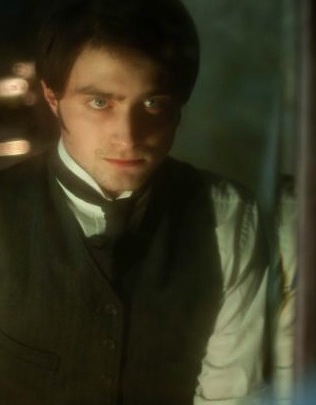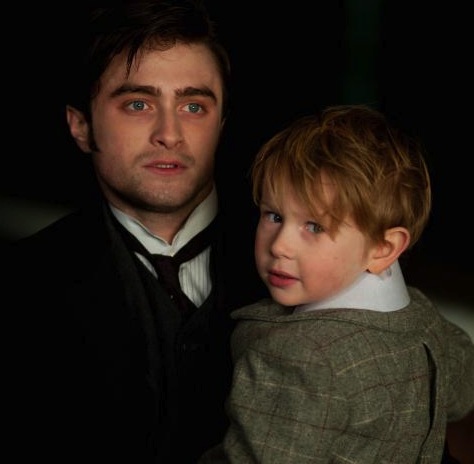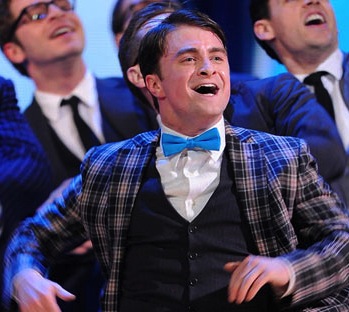 Besides looking absolutely terrifying (never live in a shoddy tudor home—that’s where creepy dead-in-the-face ladies lurk), there’s another big reason to look forward to The Woman in Black: the movie is Daniel Radcliffe’s follow up to a decade worth of Harry Potter films. Filmed before the final installment of the blockbuster fantasy franchise, Woman in Black, an old school period ghost story, may feel like familiar territory for a young actor who’s spent a good portion of his life in the otherworldly Hogwarts—but it’s anything but a retread. Directed by James Watkins (Eden Lake), the movie is straight up ghoulish horror, and it was the small scale and intimate storytelling that attracted Radlcliffe to the role. Plus, he didn’t have to wear glasses.
Besides looking absolutely terrifying (never live in a shoddy tudor home—that’s where creepy dead-in-the-face ladies lurk), there’s another big reason to look forward to The Woman in Black: the movie is Daniel Radcliffe’s follow up to a decade worth of Harry Potter films. Filmed before the final installment of the blockbuster fantasy franchise, Woman in Black, an old school period ghost story, may feel like familiar territory for a young actor who’s spent a good portion of his life in the otherworldly Hogwarts—but it’s anything but a retread. Directed by James Watkins (Eden Lake), the movie is straight up ghoulish horror, and it was the small scale and intimate storytelling that attracted Radlcliffe to the role. Plus, he didn’t have to wear glasses.
We sat down with Radcliffe when he was just finishing up his Broadway run in How to Succeed in Business, to talk Woman in Black, his future career and what advice he had for his Broadway successor, Darren Criss!
Deciding on The Woman in Black as his Potter follow up:
When I was dealing with the press for Potter, they were like, ‘You must have been really sad.’ I was like, ‘Yeah, but I was reading a script for hopefully another job, like, two hours later.’ I was quite excited as well. I was shown the script in late July of 2010. James Watkins at that point was going to direct. I watched his film Eden Lake. And I met him. And we got on very, very well, and had a similar vision of how we saw the film and what we thought it was about. Rather than just being an out-and-out horror story, it’s character-driven. In theory, it should also be moving, as well as terrifying. We saw an opportunity to make a horror film that was terrifying, but also kind of poignant, and tragic, and sad. Which is not always a combination that you have.
The post-Potter pressure:
One of the main reasons this seemed perfect was because it was a different kind of part. The part was great because it was an older part. I’m playing a father, which is a bit of a leap for some people. I don’t quite understand why. I think we put Arthur’s age at about twenty-four, twenty-five. With a five year-old son. Which is completely conceivable in modern day, and even more so in the 1800s. And so, it was perfect in essence, but it also wasn’t so different that people were going to start saying, ‘Oh, he’s now just trying too hard to separate himself,’ and all that rubbish.
It couldn’t have just been, like, a great part with some really big acting challenges. I want to do a film where people get involved in the film. Not about me! Because that’s not really what it’s about. I’m the main character, but it’s about the film as a whole. And that, for me, is what people will like about this film. They might be going in, thinking, ‘We’re going to see Harry Potter do his new film.’ But ten minutes in, they’re not going to care about any of that, and are going to want to watch the film for what it is?
On his character Arthur:
Arthur is somebody who is completely disconnected. He can’t look into his son’s face without being immediately reminded of the love of his life who died. And at such a young age. So there are such conflicted emotions about his son, and about the world, that he has become very, very detached. Just walking around in that thick kind of fog of depression. Completely disenchanted with the world.
 One of my big questions about Arthur was, ‘Why does he stay there? Why does he stay in that house?’ You’d leg it. You’d run. I was talking to James about that very early on, and he said, ‘Here’s a man who has lost his wife. And he goes to a house and starts seeing the ghost of a dead woman.’ And it’s that power of curiosity, which is such a powerful, strong, fundamental human thing, which keeps him there. Wanting to know more and wanting to have some conformation that there is an afterlife, in fact. And that this ghost is real. And this his wife is somewhere else, and somewhere good. In terms of how I prepared for it, I had a few sessions with somebody that James recommended to me. A kind of a coach to talk to me about stillness, and how minimal one can be. Arthur is not going to be a particularly expressive character—particularly, at the beginning of the film. We worked on just trying to, because I’m a very high-energy person, to cut that. Basically, that was the main challenge for me. Not being so bloody hyper all the time.
One of my big questions about Arthur was, ‘Why does he stay there? Why does he stay in that house?’ You’d leg it. You’d run. I was talking to James about that very early on, and he said, ‘Here’s a man who has lost his wife. And he goes to a house and starts seeing the ghost of a dead woman.’ And it’s that power of curiosity, which is such a powerful, strong, fundamental human thing, which keeps him there. Wanting to know more and wanting to have some conformation that there is an afterlife, in fact. And that this ghost is real. And this his wife is somewhere else, and somewhere good. In terms of how I prepared for it, I had a few sessions with somebody that James recommended to me. A kind of a coach to talk to me about stillness, and how minimal one can be. Arthur is not going to be a particularly expressive character—particularly, at the beginning of the film. We worked on just trying to, because I’m a very high-energy person, to cut that. Basically, that was the main challenge for me. Not being so bloody hyper all the time.
The challenges of playing a father:
Well, I cheated. Because I got my godson to play my son. We auditioned a load of kids. Many of them were very, very good. But before we did the auditions, I said to James, ‘Look. My godson and I get on really, really well. He’s five years old.’ Well, he was four at the time. ‘Would you audition him?’ Just because playing a father when you are a father is probably quite hard because you’ve still got to establish a relationship with those kids. And you’ve got to be natural with them. I was worried that, given that it was going to be such a short shooting period, that there wouldn’t be any time to establish any kind of a rapport with a kid. So I said to James, ‘Why don’t you audition Misha [Handley]?’ And he came in, and he was just great, and sweet, and looked brilliant on camera. And because there is already that natural chemistry there, he was just more comfortable. So that helped a lot.
Working with director James Watkins:
James is—I hesitate to say this, because I’ve worked with so many great directors—but I think that I learned more about the technical side of filmmaking on The Woman in Black, I think, than I did on any of the Potters. Because I was so much closer to it, and I was involved from the start of the process. On Woman in Black, you just see all of the decisions getting made then and there.
James also has a huge knowledge of the genre. He is a real student of horror. He has the technical and visual side of directing, while also being very, very good with actors, and very specific with what he wants and what he needs to tell the story at certain times. If there’s a line that’s expositional, or making a point that’s already been made, he’s kind of ruthless. ‘Where there is dialogue that we don’t need, we’re not going to have it.’ There’s a good little section of the film where there’s no dialogue. I think it’s the most compelling part of the film, because it’s terrifying.
 Advice for Darren Criss and Nick Jonas, who are taking over for him in How to Succeed in Business on Broadway:
Advice for Darren Criss and Nick Jonas, who are taking over for him in How to Succeed in Business on Broadway:
I haven’t met either of them yet—I look forward to meeting them. I would never dare to give advice. They’ll find their own thing. I do want to talk to Darren Criss, since he is the guy that’s actually going to be replacing me. There is one joke that I have to give him that I was given by Matthew Broderick, who was given it by Robert Moss. So, every Finch on Broadway have had this one joke, which I quite like the idea of. I’ve become aware of Darren Criss since I knew he was going to be coming into the show. I think he’ll do a great job. I’m slightly disappointed for him that he only gets to do it for three weeks, because I know that it’s gotten to a place after seven months where I’m really, really happy with the show…but it takes a while. Because you’ve got to find where all the nuances and stuff are. It’s hard. But yeah, I think he’ll do a great job. I really do. And you know what? As long as it keeps all my friends employed!
How he learned to dance:
I took private lessons with a guy called Spencer Solomon, who was a guy who danced a lot in London for our director Rob Ashford. I took lessons with him for a year. So when I wasn’t doing Potter, we did nine hours a week. We did three hours on the weekend. And just doing it and doing it and doing it every week, and getting better and better, slowly but surely. We got some of the choreography early last year, so I was able to get a bit of a head start.
What he wants to do next:
I’d love to do Shakespeare. I’d love to do Orton. But what I’d love to do more than anything else is a new play. That’s what I’d love to do. That’s the one really creative process that I’ve not been involved in yet. I’ve never done a new play. People say that’s just an amazing thing to do, because when you’re there, it’s still evolving as you’re doing it, and it’s very exciting.
=”font-style:>


